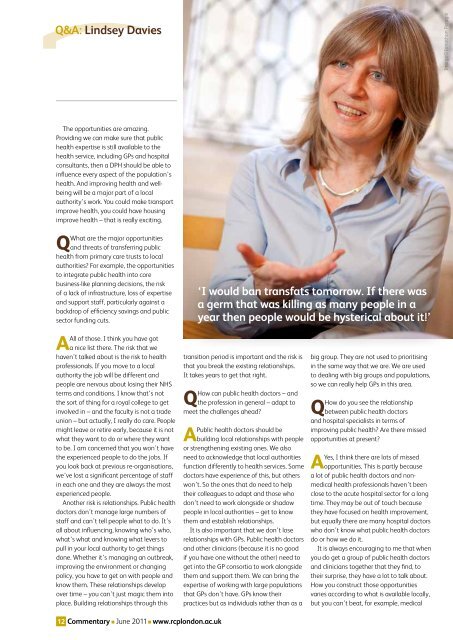Lindsey Davies: Q&A - Royal College of Physicians
Lindsey Davies: Q&A - Royal College of Physicians
Lindsey Davies: Q&A - Royal College of Physicians
Create successful ePaper yourself
Turn your PDF publications into a flip-book with our unique Google optimized e-Paper software.
Q&A: <strong>Lindsey</strong> <strong>Davies</strong><br />
Image©Jonathan Perugia<br />
The opportunities are amazing.<br />
Providing we can make sure that public<br />
health expertise is still available to the<br />
health service, including GPs and hospital<br />
consultants, then a DPH should be able to<br />
influence every aspect <strong>of</strong> the population’s<br />
health. And improving health and wellbeing<br />
will be a major part <strong>of</strong> a local<br />
authority’s work. You could make transport<br />
improve health, you could have housing<br />
improve health – that is really exciting.<br />
What are the major opportunities<br />
Q and threats <strong>of</strong> transferring public<br />
health from primary care trusts to local<br />
authorities For example, the opportunities<br />
to integrate public health into core<br />
business-like planning decisions, the risk<br />
<strong>of</strong> a lack <strong>of</strong> infrastructure, loss <strong>of</strong> expertise<br />
and support staff, particularly against a<br />
backdrop <strong>of</strong> efficiency savings and public<br />
sector funding cuts.<br />
AAll <strong>of</strong> those. I think you have got<br />
a nice list there. The risk that we<br />
haven’t talked about is the risk to health<br />
pr<strong>of</strong>essionals. If you move to a local<br />
authority the job will be different and<br />
people are nervous about losing their NHS<br />
terms and conditions. I know that’s not<br />
the sort <strong>of</strong> thing for a royal college to get<br />
involved in – and the faculty is not a trade<br />
union – but actually, I really do care. People<br />
might leave or retire early, because it is not<br />
what they want to do or where they want<br />
to be. I am concerned that you won’t have<br />
the experienced people to do the jobs. If<br />
you look back at previous re-organisations,<br />
we’ve lost a significant percentage <strong>of</strong> staff<br />
in each one and they are always the most<br />
experienced people.<br />
Another risk is relationships. Public health<br />
doctors don’t manage large numbers <strong>of</strong><br />
staff and can’t tell people what to do. It’s<br />
all about influencing, knowing who’s who,<br />
what’s what and knowing what levers to<br />
pull in your local authority to get things<br />
done. Whether it’s managing an outbreak,<br />
improving the environment or changing<br />
policy, you have to get on with people and<br />
know them. These relationships develop<br />
over time – you can’t just magic them into<br />
place. Building relationships through this<br />
‘I would ban transfats tomorrow. If there was<br />
a germ that was killing as many people in a<br />
year then people would be hysterical about it!’<br />
transition period is important and the risk is<br />
that you break the existing relationships.<br />
It takes years to get that right.<br />
How can public health doctors – and<br />
Q the pr<strong>of</strong>ession in general – adapt to<br />
meet the challenges ahead<br />
APublic health doctors should be<br />
building local relationships with people<br />
or strengthening existing ones. We also<br />
need to acknowledge that local authorities<br />
function differently to health services. Some<br />
doctors have experience <strong>of</strong> this, but others<br />
won’t. So the ones that do need to help<br />
their colleagues to adapt and those who<br />
don’t need to work alongside or shadow<br />
people in local authorities – get to know<br />
them and establish relationships.<br />
It is also important that we don’t lose<br />
relationships with GPs. Public health doctors<br />
and other clinicians (because it is no good<br />
if you have one without the other) need to<br />
get into the GP consortia to work alongside<br />
them and support them. We can bring the<br />
expertise <strong>of</strong> working with large populations<br />
that GPs don’t have. GPs know their<br />
practices but as individuals rather than as a<br />
big group. They are not used to prioritising<br />
in the same way that we are. We are used<br />
to dealing with big groups and populations,<br />
so we can really help GPs in this area.<br />
QHow do you see the relationship<br />
between public health doctors<br />
and hospital specialists in terms <strong>of</strong><br />
improving public health Are there missed<br />
opportunities at present<br />
Yes, I think there are lots <strong>of</strong> missed<br />
A opportunities. This is partly because<br />
a lot <strong>of</strong> public health doctors and nonmedical<br />
health pr<strong>of</strong>essionals haven’t been<br />
close to the acute hospital sector for a long<br />
time. They may be out <strong>of</strong> touch because<br />
they have focused on health improvement,<br />
but equally there are many hospital doctors<br />
who don’t know what public health doctors<br />
do or how we do it.<br />
It is always encouraging to me that when<br />
you do get a group <strong>of</strong> public health doctors<br />
and clinicians together that they find, to<br />
their surprise, they have a lot to talk about.<br />
How you construct those opportunities<br />
varies according to what is available locally,<br />
but you can’t beat, for example, medical<br />
12 Commentary n June 2011 n www.rcplondon.ac.uk

















